In 2019, the Centre for Economic Research was transformed into the Centre for Economic Research and Reforms (CERR) under the Administration of the President of the Republic of Uzbekistan. What are the main areas of work for CERR, both in terms of research and in terms of policy advice to the government of Uzbekistan?
To start with, I would like to mention the circumstances that made it necessary to transform the Center for Economic Research (CER) into the Center for Economic Research and Reforms (CERR).
Initially, CER was established in April 1999 for an in-depth study of the processes of reforming the economy of Uzbekistan and the preparation of proposals for the liberalization of the economy, as well as, due to the lack of experience and qualified personnel in this direction.
Since then, incredible changes have been done. A significant human resource potential has been accumulated in the field of economic management. Most importantly, in 2017, a new stage of reforms began in Uzbekistan, which was aimed at profound transformations in all spheres of life and activities of the state and society. In the economic sphere, new tasks have been set to increase competitiveness, diversify and digitalize the economy. Transition to a new economic development model is always accompanied by difficulties associated with economic management. This requires from the governing bodies more competent and scientifically grounded approaches to solve the facing problems.
On October 3, 2019, the President of the Republic of Uzbekistan adopted a Resolution on changing the situation in the development of economic policy, which transformed the Center for Economic Research into the Center for Economic Research and Reform (CERR) under the Administration of the President of the Republic of Uzbekistan.
CERR continues to conduct analytical and applied research and develop proposals on strategic directions for deepening socio-economic reforms, as well as provide information and analytical support to the Administration of the President of the Republic of Uzbekistan. But most of the assigned tasks to CERR were not present in the activities of the former Center and some of them were set in the republic for the first time.
Among the new key tasks of the Centre, we can include following:
- introduction of effective intersectoral and interdepartmental interaction of government bodies, civil society institutions, business entities;
- assistance in mobilization, consolidation and optimal usage of resources and funds of state bodies and organizations to find the most optimal ways to solve key issues of socio-economic development;
- the new tasks of the center are the generalization of mechanisms for the implementation of proposals developed within the framework of international organizations; analysis of scenarios of implemented economic policy measures; study of complex issues related to territorial development; the impact of draft regulatory legal acts on the economy and social sphere, etc.
The center also monitors trends in the state and development of the Uzbek economy, which it determines a number of indices and indicators on a weekly, monthly and quarterly basis. They are: the weekly index of food prices, the index of business activity, the index of business activity by regions, the indicator of the business climate, the index of the activity of banks, the dynamics of sales of real estate and cars.
What are the general goals of economic reform in Uzbekistan? What benefits will Uzbekistan gain moving from a resource-based development model to a more efficient, innovative, sustainable and green growth model?
The general goals of the reforms are - to create conditions for the comprehensive and accelerated development of the state and society, modernization of the country and liberalization of all spheres of life. To achieve these goals, in February 2017, the President of Uzbekistan approved the Action Strategy for the five priority areas of development of Uzbekistan in 2017-2021.
In the field of economic policy, the following tasks were set: macroeconomic stability and high rates of economic growth; economic competitiveness through structural transformation and modernization of industries; reducing the presence of the state in the economy, protecting the rights and the priority role of private property, stimulating the development of small business; comprehensive and balanced territorial development. Among the tasks associated with a green economy are - the reduction of energy and resource intensity, the introduction of energy-saving technologies, the use of renewable energy sources. Much has already been done in all these areas, which ensured a higher efficiency of the economy and led to positive social changes - the creation of new jobs and an increase in the population's income.
The most important resonance was caused by the currency reform. In September 2017, a presidential decree "On the liberalization of foreign exchange policy" was issued, which allowed legal entities and individuals to freely convert currency. Another key economic reform was the tax reform, which was completed in 2020 with the introduction of the new Tax Code, and it was aimed at stimulating entrepreneurship.
Numerous administrative ones for entrepreneurial activity were eliminated. As a result, in the Doing Business 2020 report of the World Bank, the rating of the republic improved by 7 positions, giving it 69th place, which allowed the country to enter the list of the top 20 reformers. And in the Index of Economic Freedom, produced by the Heritage Foundation in cooperation with The Wall Street, Uzbekistan has achieved notable results in recent years, as the country has risen from 152nd in 2018 to 108th in 2021 - an increase of 44 positions.
And the ongoing reforms are already yielding very good results, confirmed by economic indicators. In particular, in 2016 - 2019, the structure of the economy improved significantly towards the production of products with higher added value. The average annual growth rate of industry was 8.9% (for comparison: in Kyrgyzstan - 7.2%, Kazakhstan - 3.7%). The share of industry in Uzbekistan increased from 18.7% to 27.3%. The main increase is in the manufacturing industry, whose share in GDP increased from 11.5% in 2016 to 19.6%. The agricultural sector, which accounted for 30.8% in 2016, declined in 2019 to 25.5%. For 2016-2019 the service sector grew on average by 12% per year.
The improvement in the business environment and investment climate has led to a dynamic growth in investment. So, according to the CIS Statistical Committee, in 2019, investments in comparison with 2000 increased in Kyrgyzstan by 4.1 times, in Kazakhstan by 7.6 times and in Uzbekistan by 10.4 times. The unprecedented investment activity in Uzbekistan in recent years has led to an increase in this indicator from 21.1% in 2016 to 38.3% in 2019, which also made it possible to increase exports by more than 1.4 times, from 12.1 bln.dollars in 2016 to 17.5 billion dollars in 2019.
The economy of Uzbekistan over the years in the process of ongoing reforms is transforming from an import-substituting agrarian-industrial into an export-oriented industrial-agrarian. Moreover, in the overall technological structure of the manufacturing industry, the share of high-tech industries is growing.
A new important factor in the ongoing socio-economic policy is the start of a large-scale program to reduce poverty. In 2020, the President of the Republic of Uzbekistan in his Address to Parliament for the first time in the history of the country raised the issue of poverty. Has CERR conducted surveys showing the incidence of poverty in Uzbekistan?
CERR jointly with the Ministry of Economic Development and Poverty Reduction has developed a draft Concept for Poverty Reduction in Uzbekistan. Criteria and methods for calculating poverty, effective instruments for its reduction, a long-term strategy for overcoming poverty, based on successful international experience are being developed.
To test these developments, CERR implemented a pilot project to reduce poverty, support the poor and needy groups of the population. A new project to reduce poverty was successfully tested in the Buka and Chinaz districts of the Tashkent region. The project "Listening to the citizens of Uzbekistan", which is being implemented by our center and the Center for Development Strategy with the assistance of the World Bank has great importance in the work on defining the criteria for poverty and measures to overcome it.
But, despite the fact that the Poverty Reduction Program is still under development, measures aimed at its reduction are being actively implemented. The introduction of a new mechanism for registering the poor families played important role in this process. Real problems and the standard of living of specific families began to be identified through home visits to households, on the basis of the form. Targeted programs for the construction of affordable housing and improvement in urban and rural areas are being implemented. Those who need to improve their living conditions are provided mortgage loans on preferential terms.
It should be emphasized that in the past year, due to the pandemic, the problem of poverty in Uzbekistan has significantly aggravated. This has caused the need for prompt practical action for more intensive social support of the population.
Last year, on the basis of the listed poor families, more than 2.5 million members of over 590 thousand families were supported and 527 thousand people were employed. In addition, the initial payments for housing was carried out for more than 1,000 women in difficult life situations. More than 13 thousand citizens received new apartments within the framework of the State Program for Providing the Population with Affordable Housing.
In addition, the return of labor migrants not only deprives their families of additional income, but also contributes to the expansion of the informal employment sector, which by the end of 2020 (even excluding migrants) makes up about 43% of the total employed population, which reduces the tax and social base. To support the incomes of these population groups, many bureaucratic restrictions on self-employment have been removed and they have been granted extensive tax breaks. Thanks to these measures, the legal labor activity of 500 thousand people was established. Also, this group of the population was allocated 300 billion soums of soft loans and subsidies for the development of dekhkan farms and household plots in rural areas.
Thus, in recent years, a lot has been done to reduce poverty, but there is a need to increase efforts in this direction and they will continue. The development of the Poverty Reduction Program will make it possible to give these efforts a systemic and comprehensive character on a scientifically based basis.
Uzbekistan was one of the few economies that did not go into recession last year due to the pandemic crisis. The negative economic consequences were effectively minimized. What makes the Uzbek economy sustainable to external shocks and what are your predictions regarding the post-pandemic recovery of the Uzbek economy?
Indeed, Uzbekistan managed to overcome the most difficult year of the pandemic quite successfully, both in terms of combating the spread of coronavirus and in terms of minimizing negative economic and social consequences. Economic growth last year amounted to 1.6%, the volume of production in the agricultural sector increased by 3%, the service sector - 2.3%, and industry - 0.7%.
In order to minimize the damage to the economy, primarily small and medium-sized businesses, the state assumed most of the economic and financial costs during the pandemic. Many benefits and preferences were provided to entrepreneurs. In 2020, 100 trillion soums of loans were allocated to business entities –almost 4 times more than in 2016. 2.3 trillion oums of tax benefits were provided to economic sectors and 3.6 trillion soums were allocated from the Anti-Crisis Fund to support them.
The measures taken to support the economy made it possible to overcome the low point of the industrial decline in early May and to overcome the low point of the decline in most service industries by mid-June. And already in August, measures were approved to restore economic growth in 2020-2021, which should ensure a stable economic growth rate of 5.0-5.5% from 2021. The effectiveness of these recovery measures is evidenced by the dynamic growth of the Uzbek economy since the beginning of this year.
In the first six months of this year, GDP increased by 6.2%, while in the same period last year, due to the pandemic, the economy of Uzbekistan grew by only 1.1%, and in the first three months of 2021 by 3%. Inflation continues to slow down: prices increased by 4.4% compared to December last year, while in 2020 for the same period by 4.6%. The inflow of investments into the economy returned to positive dynamics. Investments in fixed assets increased by 5.9% against a decline of almost 10% in the same period last year. The positive dynamics of production is observed in all sectors of the economy. The main drivers are industry and the service sector. There was also a significant increase in wages.
The growth of household incomes, as well as the volume of investments, have become important factors in supporting aggregate demand in the economy, which is one of the most important incentives for economic growth in the conditions of its recovery, which makes it less susceptible to external shocks. All indicators, both macroeconomic and various indices tracked by our center, clearly indicate a confident positive dynamic of the recovery processes this year.
If we talk about the prospects for further growth, according to the estimates of the Central Bank of the Republic of Uzbekistan, it is expected that in 2021 real GDP growth will be in the range of 4.5-5.5%, laid down in the baseline scenario. The World Bank predicts that the growth of the economy of Uzbekistan in 2021 and 2022 will reach 4.8% and 5.5%, respectively, and the EBRD-5.6% in 2021 and 6% in 2022.
Given that these forecasts are significantly higher than in many countries of the world this year, it can be stated that in the process of overcoming the challenges of the pandemic, Uzbekistan has managed to strengthen the competitive position of its economy relative to the economies of other countries. At the same time, it should be considered in mind that the ongoing economic reforms are already giving a tangible positive effect, which will only increase in the conditions of post-pandemic recovery growth of the world economy.
Since 2018, the project "Listening to the Citizens of Uzbekistan" has been implemented by CERR and the Center for Development Strategy with the assistance of the World Bank. Could you tell us more about this project and the main conclusions of the household surveys conducted within the framework of this project?
This is a very interesting and important project, since the data collected during the implementation of the "Listening to the Citizens of Uzbekistan" project is taken into account when developing government measures to reduce the level of poverty among the population, mitigate the socio-economic consequences of the pandemic for vulnerable segments of the population, as well as when planning programs to restore the economy of Uzbekistan in the post-crisis period.
Within the framework of this project, monthly surveys of respondents are conducted throughout the country, which are also attended by the chairmen of 600 mahallas (local self-government bodies of citizens) in all regions of Uzbekistan. In 2020, 5.4 thousand households from all regions of the country were selected and a pilot survey of their composition, income and expenses was conducted.
After the implementation of quarantine in March 2020, the project also began monitoring the impact of the pandemic on the socio-economic well-being and health of citizens. The results of these surveys are also interesting. Thus, in the period before the pandemic, the average monthly income of one poor household in January-March 2020 was approximately 1.5 million. soum, which in comparable prices was 12% more than this indicator for the same period of the previous year. According to research conducted in October last year, the measures taken by the government very significantly contributed to mitigating the social consequences of the pandemic for the population. For example, if in April the level of income from self-employment fell by 68 percent compared to March, in October the level of income from self-employment exceeded the level of March by 17 percent. The level of wages in October rose by 26 percent from the level of April. At the same time, the number of people living in extreme poverty is decreasing. If in April 71 percent of respondents had no savings, in October this figure fell to 64 percent.
According to the survey data, in the period from April 2020 to January 2021, the number of citizens' requests for social assistance decreased in the last months of 2020. The number of new applications for benefits for the poor from August 2020 to January 2021 decreased by about half, and the number of requests for help from charitable foundations almost to zero in 2021. In general, since April 2020, about 5.2 million people have received financial assistance in one form or another at least once.
Taking into account the impact of the pandemic on the survey in 2020, this year it was decided to increase the coverage of the household survey conducted with the support of the World Bank from 5,400 to 10,000 The results of this study should be ready in November 2021. Based on these results, it is planned to clarify the preliminary indicators of minimum consumer spending and the level of poverty by the end of this year.
Uzbekistan is currently pursuing an active policy of economic integration both at the regional level and with the rest of the world. From an economic point of view, what benefits does Uzbekistan expect to receive from membership in the World Trade Organization (WTO), as well as from the Enhanced Partnership and Cooperation Agreement (EPCA) and the GSP + agreement with the EU?
The expansion of equal and mutually beneficial trade is always beneficial for any country. That is why in recent years Uzbekistan has intensified its efforts to expand foreign economic relations with the whole world, both with specific countries and their associations, international economic organizations, and at the regional level.
If we talk about the WTO, then joining this organization is required by the interests of the development of the economy of Uzbekistan, which has a number of certain competitive advantages, which can be realized more effectively as a member of the WTO. It is indicative in this regard that Uzbekistan applied for observer status in the WTO in 1994, and in 1995 a working group on joining this organization was formed. However, the insufficient competitiveness of industrial production and the rather strict administrative management of the economy at that time did not allow the existing economic potential to be fully realized. Therefore, the process of joining the WTO has been slowed down for a long time.
Economic reforms were necessary, which began with the coming to power of President Shavkat Mirziyoyev, who initiated the resumption of the process of Uzbekistan's accession to the WTO, and was officially announced in his message to the Parliament of Uzbekistan in December 2017. This decision was supported by both the United States and the European Union, which in 2019 provided a grant of 5 million euros to finance the accession process.
Our Center for Economic Research and Reforms conducted a preliminary assessment of the consequences of Uzbekistan's accession to the WTO using the calculation methodology "Trade Creation Effect" and "Trade Diversion Effect". Upon joining the WTO and reducing import customs duties by 50%, according to preliminary calculations, the volume of imports to Uzbekistan may increase by 5% in general, and for products of certain industries from 2% to 13%. The impact on exports from Uzbekistan's accession to the WTO will generally be positive, since the WTO member countries will apply import duty rates agreed within the WTO to Uzbekistan and these rates may be lower than those currently applied to Uzbekistan. As for the GSP+ agreement with the European Union, it was successfully concluded and since April of this year, the special EU system of preferences for sustainable development and effective management (GSP+) has entered into force for Uzbekistan, according to which tariffs on a number of such important export goods for Uzbekistan as fabrics, clothing and plastic products have been canceled. Within the framework of GSP+, the number of commodity items that Uzbek producers will be able to export duty-free to EU countries has increased to 6,200. It is expected that in 2021, exports will amount to $142 million, and in 2022, $242 million. This will allow Uzbek products to strengthen their competitive position in the European market, since high transportation costs are compensated by the removal of customs duties.
For example, if earlier Uzbek textiles were taxed at the entrance to the customs territory of the EU with customs payments in the amount of 17%, now the payments have decreased to 6%. If, according to the Uzbekistan Textile and Garment Industry Association, textile products were exported to the EU countries for $74 million in 2020, and for $27.5 million from the beginning of 2021, then according to its forecasts, it is expected that textile exports to the EU can reach $300 million in the short term, with its subsequent increase to $1.2 billion by 2025.
It is also expected that the GSP + beneficiary status will help not only increase Uzbekistan's exports, but also accelerate the reforms of a number of industries, including introducing modern standards and technologies, acquiring the necessary knowledge and skills, ensuring the necessary level of quality, and also giving an opportunity to accumulate experience in markets with high requirements. The current Partnership and Cooperation Agreement (PCA) between the EU and the Republic of Uzbekistan was signed back in 1996. But since then, Uzbek-European relations have significantly expanded. In addition, the reforms initiated by President Sh. M. Mirziyoyev imply a higher level and dynamics of interaction with Uzbekistan's foreign partners, including the European Union.
In this regard, in 2017, the new leadership of Uzbekistan requested an official update of the PCA, and in July 2018, the European Council adopted a negotiating mandate to open negotiations under the updated Enhanced Partnership and Cooperation Agreement (EPCA). To date, several rounds of negotiations have been held on this document, and it is expected that its development will be completed this year. The agreement should cover such areas as political dialogue and reforms, the rule of law, security, human rights, the fight against corruption, migration, trade, economic and sustainable development.
We expect that according to the new expanded agreement, the EU will expand support for the ongoing reforms to further deepen market transformations in the economy and democratic transformations in public life and public administration. In addition, the conclusion of the new agreement should contribute to the expansion of both trade and economic ties, as well as the expansion of educational, scientific, cultural and other ties between organizations and citizens of Uzbekistan and European countries.
Diplomatic world: 86-91 pages

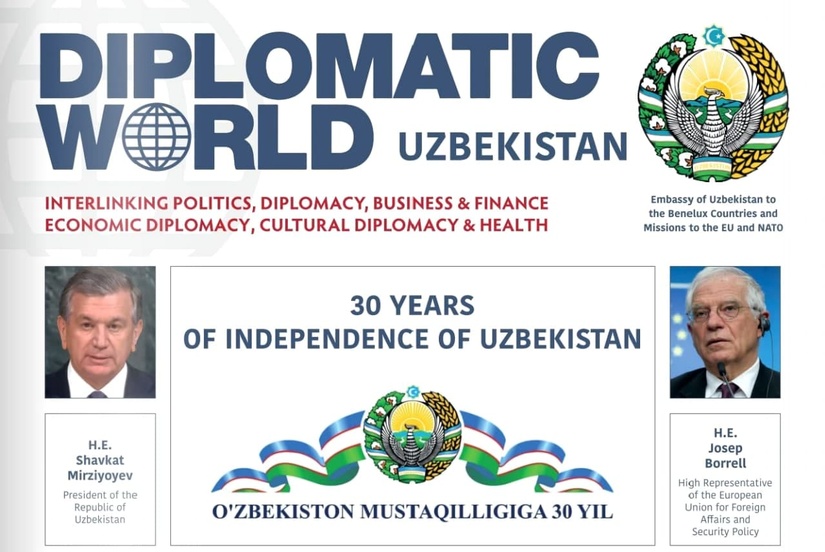
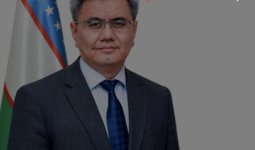
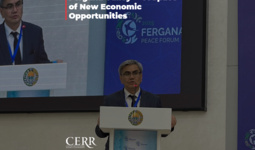
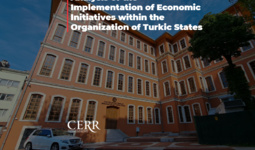
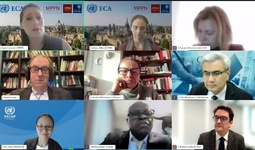
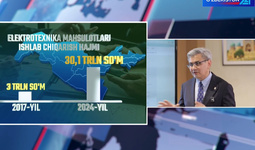
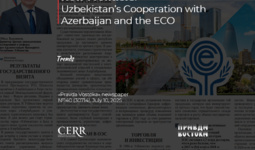













leave a comment